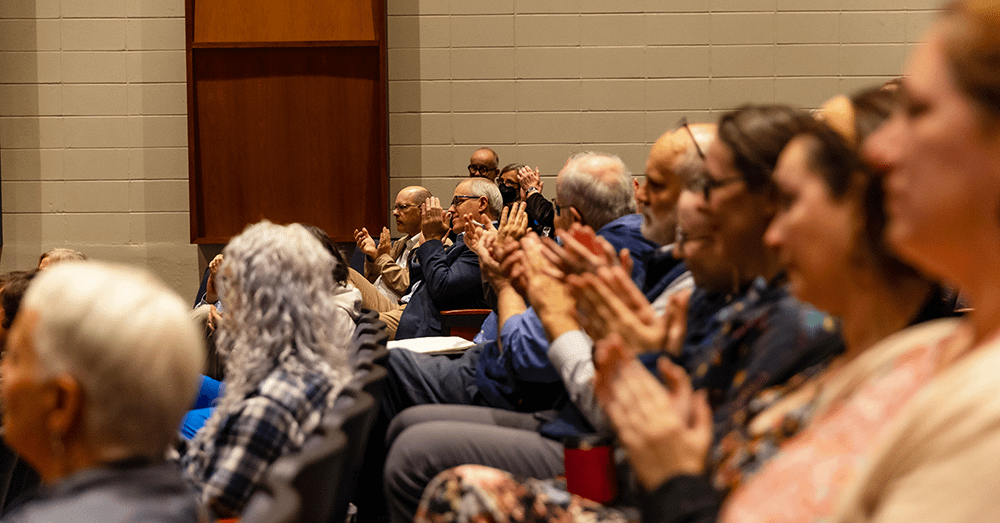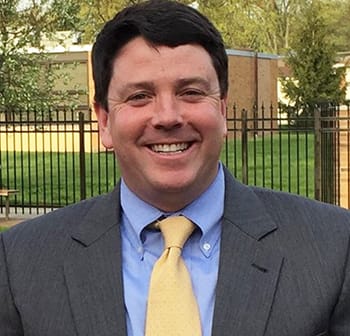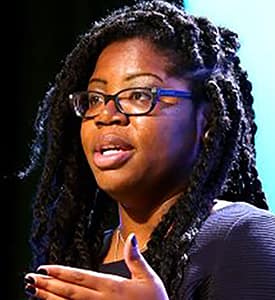“Othering” hurts campus, nation, world, panelists say
Roily and confounding currents in American society and world geopolitics overwhelm us and make it hard to settle on specific actions that preserve hope and sanity, posited panelists in a campus-wide conversation among more than 100 Saint Michael’s people Tuesday evening in the Dion Family Student Center.
Still, practical answers can be found to move the communities of the College, the U.S., and the world toward greater justice and understanding, even if it’s not always so easy, suggested speakers during this rescheduled forum from last week’s MLK Jr. Week program. Titled “Reflections on Community,” it was a conversation that organizer Moise St. Louis of the Multicultural Affairs Office called the most important of the Convocation Week. He hopes it will seed ongoing dialogue in view of post-election incidents of hate and intolerance on campus first semester, and he had a sign-up sheet for follow-up meetings.
Some panelist suggestions:
- “Start here on your own campus, your own dorm, your own back yard,” said Traci Griffith of the journalism faculty, who, like others among the eight panelists, had written a personal piece for a “common text” informing last week’s MLK events. She described experiences when the “othering” of her or family members as people of color provoked feelings of being dehumanized. “How do you live your life recognizing there are people around you who have no feeling or understanding for you?” she asked, noting that such “othering” makes it possible “to hate without ever knowing” a fellow human as a person.
- Ponder this experience of being “othered” in your own life and discuss it briefly with the person sitting beside you (as audience members then did), suggested moderator Patti Delaney of the sociology/anthropology faculty, who listed derogatory and course terms she has heard directed at herself in varied circumstances for being a self-possessed and assertive woman, which made her feel like the hated “other.”
- “Think universally,” and picture the faces of your own loved ones under the same duress when hearing stories of refugees, immigrants or discrimination; be prepared to fight for what’s right in coming years since it feels inevitable; and “embrace our common humanity,” said David Mindich of journalism, whose mother narrowly escaped the Nazis as a young Jewish girl in France in 1941 against long odds posed by very restrictive immigration rules that might sound troublingly familiar today to Muslims and others.
- Be aware and think of what it means to travel as a foreign-born person of color at any time, much less now with new Trump executive orders that promise to double-down on humiliating hassles, said Tara Natarajan of the economics faculty, an American citizen born in India. She shared harrowing tales just from her own family members about the all-too-predictable dehumanizing ways of border and airport security. “We now live in a surreal world where inciting fear and prejudice have become a platform for a government,” she said; and let’s face it, she added, it’s not so much being foreign as being dark-skinned that brings such scrutiny — a fact borne out by later stories from white Irishmen Declan McCabe (biology) and Greg Delanty (English) of the faculty panel, who said they rarely if ever face such immigration hassles. “If I, as an educated and confident woman and American citizen, feel this vulnerable and intimidated, how must it feel for my hijab-wearing refugee friends or my Saint Michael’s colleague from Iran here on a green card, or Punjabi and Sikh friends with turbans? I have no clue how these others make it,” said Natarajan. She told how she and St. Louis were shocked at an earlier campus meeting to hear how little awareness was demonstrated by an immigration attorney on the realities for dark-skinned, foreign-born travelers to and from the U.S. going through customs. Always have ample documentation when traveling, she said.
- “I think people can transform … I wish us to get to know each other, make friends and have conversations,” said Declan McCabe of biology, who told how he did just that decades ago as a newcomer to America from Ireland on a study visa – possessing, to some extent, if sometimes unconsciously, narrow perspectives from what he called a largely racist and homophobic and nearly all-white culture, and coming from a small town. But he made friends of all races and backgrounds in Philadelphia as he studied, getting all sorts of breaks for being a white male immigrant, and came to realize where he had been wrong on many previously held views, soon realizing the privilege he enjoyed relative to other immigrants with brown skin. He now hears people complain of “lazy foreigners,” but was having none of that talk, given what he knows of what it takes just to make it in the U.S. — “there’s no lazy foreigners in this country – those people are still on the couch in their original country!” he said.
- “What I’d like to say is, you should all take poetry,” said McCabe’s countryman Greg Delanty of the English Department, an Irish poet and committed environmental activist who said in his classes he helps students see, through poetry, that the human experience deep-down is mostly similar among us, across times and cultural groups, with typical common themes like love or politics. A later questioner asked about the importance, though, of respecting and acknowledging differences, too, and Delanty said “until you see the sameness in that person, you can’t deal with differences — it will just shut down.” He read a poem from the common text that he wrote about seeing two African-American students on campus and admiring their human beauty, with the closing line based on the Irish-language word for black people that also means blue: “Oh, my beautiful blue sister and brother,” he read.
- “I always doubted that the arc of history bends toward justice, but rather believe that it oscillates or careens wildly –and the last few months seem to indicate that,” said Michael Bosia of political science, who shared some of his experiences as gay man and political activist, starting during the early days during the AIDS epidemic in San Francisco in the 1980s. He warned against a phenomenon called “pink-washing” where authorities who want to exercise hate against some groups “use language of positivity in order to do that, but it’s a façade or pretext.” He said the case of his own mother offers him hope that people can change attitudes for the better since she came to support and admire President Obama and accept Bosia’s husband, even though at one time in her earlier life she would have held strong prejudices against both for who they were. During the recent Women’s March in Washington, when he was helping others and being helped over a wall on the way to a destination with all the symbolic power that held, Bosia said, he learned “this resistance is a movement of women and women of color. My vow is to follow women and women of color who are leading this movement – my voice is less important.”
- During Q&A after the speakers, Griffith was asked what those who come from a place of privilege might usefully do in their attitudes and action. “Don’t say ‘I know what you feel – you don’t – but acknowledge something is happening and listen to what is being said. Acknowledge these problems do exist, it’s not all in my head.”
- Panelist Kristin Gehsmann of education spoke of the role she perceives for herself as an educator to be a “lead learner,” and observed that for the first time, whites are in the minority in U.S. public schools. “Many of you have experiences I need to learn from. and that’s the purpose of community,” she said. In answer to a later question about what a person might do to improve understanding, she said, “showing up is part of it, but we also need to be respectful and avoid the ‘do-gooder syndrome.’ Intentions matter, but impact is what matters most – and assume nothing. If you’re going to assume something, assume the best.”
One white male student, during questions, frankly spoke of the prejudices he knows his family members hold, and wondered how best to deal with it — how to “tell them I’m here talking with all of you today.” Greg Delanty’s advice, based on experience was to “be careful how you tell them – don’t’ make it out to be a battle — but you also have to live your own life. Take it easy on the parents.” However, David Mindich said as a balance, “In understanding where Trump supporters got their frustrations, we also have to be a little impatient,” noting that, based on his mom’s experiences with Nazis, “the consequences of not doing anything are always great wherever we are in history.” Mindich said the old saw about the job of journalists – “to comfort the afflicted and afflict the comfortable,” seems to apply today as urgently as ever.
Traci Griffith had the last word: “Ask yourself what you are doing in your dorm, try reaching out to international students on our campus, making this feel like a place everybody feels like they belong,” she advised students. “It doesn’t take that much to reach out to the person sitting next to you in class If you feel problems of the world are way overwhelming, do what you can in your own little sphere of the world.”





